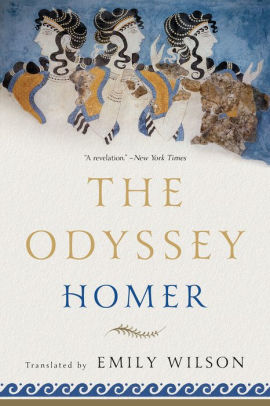
The Odyssey is a Greek Epic poem by Homer. It recounts the adventures of the Greek hero and King of Ithaca, Odysseus. Beginning ten years after the end of the Trojan War, Odysseus attempts to return to his palace on the island of Ithaca. The rest of the world believes him to be dead, and Penelope and Telemachus, his wife and son, struggle to maintain rule against a crowd of suitors. Led by Antinous, these suitors loiter in the palace and each seek to marry Penelope. Unbeknownst to them, Odysseus is still alive.
The goddess Athena, a patron of Odysseus, convinces the other Olympian gods to help Odysseus return home. She helps Telemachus by taking on the disguise of Laertes, a trusted advisor, and persuades the young prince to call a meeting of the Ithacan assembly, where he criticizes the suitors. Telemachus then embarks on a journey to Pylos and Sparta, where he learns from Kings Nestor and Menelaus that Odysseus is indeed alive and trapped on the island of Ogygia. Back on Ithaca, Antinous and the other suitors plot to kill Telemachus when he returns.
Meanwhile, a homesick Odysseus is trapped on Ogygia by the goddess Calypso. Athena sends Hermes, the messenger of the Gods, to Ogygia to free Odysseus and convince Calypso to help him build a raft in order for the hero to return home. As Odysseus sails across the sea, the god Poseidon, who has a hatred for Odysseus, creates a storm that destroys his raft once again. With the help of Athena, Odysseus reaches the shore of Scheria, the land of the Phaeacians. The Phaeacian princess, Nausicaa, welcomes Odysseus and brings him to the palace. After telling the story of his adventures, Odysseus is given a fleet to return home at last. Once back home, Odysseus takes on the disguise of an old beggar. Eventually, he reveals his identity to Telemachus. With his son, Odysseus devises a plan to kill all the suitors and reunite with his wife. In the end, Odysseus’s long journey comes to an end as he regains control of his kingdom and reunites with his family.
One thing I really like about this epic poem is its message that mental strength is often more powerful than physical strength. Throughout the story, Odysseus relies more on his wits and determination than his physical strength. For example, he knows that he cannot defeat all the suitors in a head-on fight, so he manipulates the suitors so that he and Telemachus are the only ones with weapons, leaving the rest unarmed. His clever plan exploits the stupidity of the suitors, resulting in his victory. It is also fitting that Odysseus is mainly supported by Athena, the goddess of wisdom. Odysseus’s character is starkly contrasted by that of Achilles, another Greek hero mentioned in the poem. While Achilles has extreme physical power and invincibility, allowing him to win great glory, he met a violent end. On the other hand, Odysseus instead uses his shrewdness to achieve something greater than glory: a long and peaceful life.
Overall, I would rate this book a 10/10. As a fan of Greek mythology, I enjoyed learning about famous Greek heroes and their Gods, as well as their kingdoms and wars. In addition, Emily Wilson’s translation of the poem is easy to understand and highlights the most essential parts of the epic. I would recommend this poem to readers who like mythology-based works, such as Rick Riordan’s Percy Jackson series, and are interested in delving deeper into the stories and lore of the ancient Greeks.